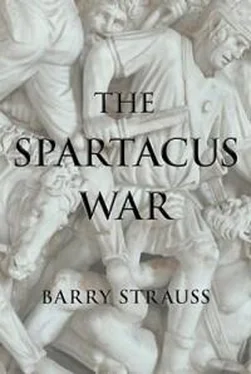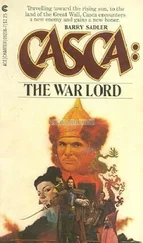There may be an echo of the Thracian woman’s propaganda in the statement of a Roman poet that Spartacus ‘raged through every part of Italy with sword and fire, like a worshipper of Dionysus’ [38] Claudian, Gothica 155-6.
. The writer, Claudian (c. AD 370-404), lived nearly 500 years after Spartacus, but he had an interest in Roman history, so his words may reflect a good source.
By invoking Dionysus, the Thracian woman stirred a chord among foreign-born gladiators and slaves as well as among Italians who remembered Mithridates’ support during the Social War. Her message was, in effect: ‘If you supported Mithridates’ revolt against Rome, then support Spartacus!’
As we have seen, we don’t know whether Spartacus himself supported Mithridates when he deserted the Roman army before 73 BC and became a latro, i.e. a bandit or a guerrilla. In any case, once he revolted against Rome in 73 BC, no doubt Spartacus was glad to make common cause with Mithridates’ supporters.
By the same token, there is no reason to think that Spartacus had ever served Rome with a whole heart. One historian [39] Emilio Gabba, Appiani, Bellorum Civilium Liber Primus (Firenze: La Nuova Italia Editrice, 1958), 317. cf. 211-12.
has made a plausible guess about the details of Spartacus’s military service. In 83 BC the Roman general Sulla prepared to cross from Greece to Italy in order to wage civil war. He recruited infantry and cavalry from Greece and Macedonia to join the forces he already had. Spartacus might have been one of those soldiers.
At the time, some of the Maedi had recently been defeated by Sulla, after which they had accepted Rome as overlord. It would not have been surprising if they sent a contingent of soldiers to fulfil their responsibility. If Spartacus and his fellow Thracians fought for Rome they could hardly have been happy about it. Sulla had invaded Thrace in response to Thracian raids on Roman-controlled Macedonia, raids inspired by Mithridates’ revolt. In Thrace, Sulla treated the natives virtually as target practice for his army. Those who escaped with their lives probably lost their property, since Sulla’s men got rich from loot. This was the country that Spartacus served, deserted from, and finally revolted against.
Assuming that Spartacus was a young man of about 20 when Sulla recruited his soldiers in 83 BC, the gladiator would have been about 30 in 73 BC, when his revolt began. As an ex-Roman soldier who turned on Rome, Spartacus fitted a pattern. Over the years, some of Rome’s worst enemies had served in the auxilia. Take Jugurtha, charismatic King of Numidia (modern Algeria), whose armies humiliated the Romans for six years before the Romans finally captured him in 106 BC. Years earlier in 134 BC he commanded the Numidian cavalry in a Roman army fighting rebels in Spain - an education for him in Roman ways. Jugurtha put his lessons to good use during his war by bribing Roman politicians.
The worst turncoat was someone who lived after Spartacus, Arminius, also known as Hermann, a German tribal chieftain who not only served in a Roman allied unit but also won Roman citizenship and the rank of knight. That did not stop him from going home and giving Rome its worst defeat ever in Germany, the massacre of three Roman legions in the Teutoburg Forest in AD 9. It was a turning point in history. Without that defeat, Rome might have conquered Germany, and a Romanized Germany would have changed the whole course of European history. Never has a country raised a hungrier wolf in sheep’s clothing.
Spartacus’s feelings towards Rome and its enemies are likely to have been complex. Pride, rage and shame are all part of what he may well have felt towards the Roman army. Solidarity, suspicion and opportunism all may have marked his attitude towards Rome’s enemies. These feelings were contradictory but Spartacus did not have to be consistent: as soon as the Thracian woman spoke, he had a god on his side.
By her prophecy, Spartacus’s lady gave her man a holy duty. As a servant of Dionysus, Spartacus would be a liberator. He would be no mere theorist of freedom; he would have ‘great and fearful power’ [28] Plutarch, Crassus 8.4.
. For a Thracian, power had a clear definition. A powerful man was a warrior, a hunter, a possessor of many horses, the father of many children, and a great drinker. In a word, he was a chief.
We don’t know the dynamic among the different ethnic groups in the house of Vatia. But judging by their later actions, we might guess that each nationality stuck together. Spartacus most likely began with his fellow Thracians. He had to convince them, first, to agree to overpower the guards and break out of the house of Vatia. To do that they would need weapons, but the weapons were kept under lock and key. So they would have to choose the right moment, either a time when they could steal the key or when the weapons were being distributed, say, on the eve of a match. They would fight - and how stirring to do so in the name of Dionysus Zagreus and Sabazius!
Celtic gladiators were probably a harder sell, since they were unmoved by Thrace’s national god. But they too had a score to settle with the Romans; they too could see just how rich in loot the land around them was. And they would have appreciated Spartacus’s authority, both human and divine.
They might have agreed to join Spartacus but it’s not likely that they agreed to take orders from him. The Celts were as sensitive about status as any people in the ancient world. At feasts, for example, Celtic men sat according to rank. When the meal was served, the bravest man got the ‘hero’s portion’ of meat. If someone challenged his right to it, then, according to Celtic legend, the two men had to fight to the death. So the Celts did not challenge Spartacus to a duel but they did choose two leaders of their own, Crixus and Oenomaus.
We know nothing about the two men. Since they were Celts, they were probably proven warriors, possibly from noble families, and likely to be able to guarantee a large number of followers. Some sources make them Spartacus’s equals, others say that he was commander-in-chief of the rebels. The distinction matters little, because in insurgencies formal command structures count less than informal sources of power: charisma, persuasiveness, supporters and a record of success.
Two hundred men decided to join Spartacus - no small achievement on his part. But most of them never managed to escape because the plot was betrayed. Who leaked the information - a free person or a slave - is not known. We can only guess how Vatia or his agent reacted. He may have locked the doors, had the most dangerous gladiators chained, and called in armed reinforcement. Fortunately for the rebels, some of them reacted quickly. They would have to fight their way out. The only weapons in the house were locked up, so they had to make do with what they could get.
They went to the kitchen. The kitchen was rarely a pleasant part of a Roman house. It was usually small, smoky due to poor ventilation, dirty thanks to its packed dirt floor, and called to do double duty as a latrine. From here the gladiators took cleavers and skewers. Roman cleavers were butcher’s big iron knives that could sever a hand. Skewers, also iron, could easily prove fatal if aimed at soft tissue like the neck and, with enough force, could even kill a man through his chest [40] Archiv für Kriminologie 211, 5-6 (May-June 2003): 174-80. http://www.ncbi.nlm.nih.gov/sites/entrez?db=pubmed&cmd=Retrieve&dopt=AbstractPlus&list_uids=12872687.
. The guards, it seems, were well armed and in no short supply: of the 200 conspirators, only 74 gladiators escaped, along with at least one woman, Spartacus’s Thracian companion.
Still, the guards seem to have had their hands full with the gladiators left behind, as the rebels were able to stop on the road not far from the ludus. They had come across some carts loaded with gladiatorial weapons heading for another city. The fugitives got rid of the drivers and helped themselves to the arms. These weren’t as battle worthy as the equipment of Roman legions but they were a major step up from kitchen utensils. Perhaps Spartacus now found a sica [41] in one of his poems (Carmina 9.253), the late Roman man of letters, Sidonius Apollinaris (c. AD 430-489) describes Spartacus as wielding a sica in battle against Rome’s consuls.
, the curved Thracian sword that had been denied to him in the arena. According to one ancient source, Spartacus wielded a sica in his battles.
Читать дальше












